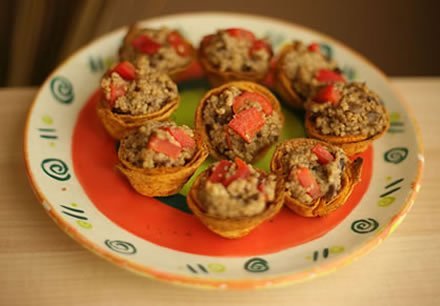
(Vegetarian, vegan option)
My friend, Amy Sciaroni, is Swiss. Not as in “someone on my mother’s side snuck in and diluted the Italian blood.” The entire Sciaroni clan is descended from the Alps. It’s more like some Italian snuck in and mingled with the Swiss blood, and somehow managed to get the whole tribe from then on out named after him.
Don’t be fooled by the fact that she can make gorgeous pasta from scratch without a recipe, curse with elegance and gesticulation, believes that every good meal should include wine and be shared with friends, and has been known to utter the words “che bello!”. She’s Swiss.
The answer to Juliet’s question, apparently, is “everything”
At a recent gathering, Amy whipped up these lovely and surprisingly spicy couscous cups. She used canned black beans and they were delicious, but since I’m on a quest to use a different heirloom bean each week, when I tried the recipe out myself I went with an heirloom black turtle bean.
The beans have been sitting in a glass jar on a kitchen shelf, shiny and pretty, for two years now. I bought them at the Maplewood Farmer’s Market several seasons ago from my friend and longtime farmer, Paul Krautman of Bellews Creek Farm (I once tumbled off a tall stack of hay bales out at Paul’s farm. I was helping to plant garlic. Don’t ask me why I was standing atop a tower of straw. No injuries though – I landed on more hay. Nevertheless, you should have seen Paul’s face when I fell).
Before I get to the recipe, I must throw in a PSA. Amy needs a roommate. Right away. Those of you in the St. Louis area, please pass this link (http://stl-home-to-share
The Recipe:
Paul hand-harvested these heirloom turtle beans. I know that doesn’t change their flavor in any way, but it gives them an added dimension somehow, knowing that they went through human hands.
This heirloom variety was first introduced in the late 1700′s, and the seeds are jet black. When cooked, the hue fades to dark brown. The bean is common in South and Central American as well as in China , where it is often fermented.
For the couscous, I cheated (and so did Amy). I used a box mix. Traditional couscous requires considerable work to prepare, but these store-bought semolina granules are nearly instant, and the sun-dried tomato flavoring suits the mixture. Plus, the lentil, semolina and bean combo makes a complete protein source. ( I’m telling myself that it’s okay to do some things the easy way; I’m sure all of you are thinking “It’s about time!”)
And then, I make up for the corner cutting with the tortilla cups. They’re really easy to make, but they do require another step. The first time I made them I used whole wheat tortillas, and let me just say, don’t try that. They’re much too thick and tore when I tried to fit them into the muffin tins.
The amount of spicy oil, and its degree of spiciness, will of course determine the heat of your couscous cups. I used a homemade chili oil, which had quite a lot of heat. Trader Joe’s sells a milder version. To cut the cups, you can use a biscuit cutter. I like Amy’s method better. She keeps an old tomato sauce can just for things like this, and it also comes in handy when she’s cutting ravioli from pasta dough.
Amy used goat cheese in her couscous cups; since I’m vegan right now, I omitted that. The flavor is big enough that you don’t miss it that much.
Other than that, there’s not much to say about this. It’s my most straightforward recipe yet.
Spicy Cous Cous Cups
4 large flour tortillas
3/4 cup of sesame chili oil
1 box tomato and lentil cous cous
2 cups cooked black turtle beans
¼ cup fresh parsley
1/2 cup olive oil
1 red bell pepper, finely chopped
3/4 cup crumbled feta or goat cheese (optional)
Using a 2 1/2″ to 3″ biscuit cutter (or tin can), cut circles out of the flour tortillas, about 3 dozen. Brush both sides with sesame chili oil and press into a mini-muffin pan. Bake at 400 for 10 minutes. Remove and cool.
Prepare cous cous according to package instructions. In a food processor, blend the black beans, parsley and olive oil until a chunky paste forms. In mixing bowl, combine the cous cous, bean paste, cheese (if using), and red peppers and stir well. Fill the cups just before serving.
These are great to make a day ahead, just store the tortilla shells in an airtight container and warm before filling and serving.

Wow, I loved Amy already, but now I love her even more! I can’t wait to try these! Since i can’t eat the wheat tortillas though or the couscous (yep, i’m gluten free for all of those that don’t know me), I wonder how corn tortillas would do? I thought about using brown rice tortillas too, but they are very thick and you recommended against that. There are also teff tortillas I can get my hands on, but corn might work. And instead of cous cous, quinoa would be my grain of choice!
I’ll try to find the chance to make this with these substitutions, Becky, and I’ll let ya know how it turns out!
YUM!
I tried these over the weekend and they came out SPICY! It wasn’t a bad thing but not everyone in my family could eat them. So I’ll just second the statement that the spiciness of the oil and the amount you use will have a big impact on the outcome. For me they were great — not so much for my 11 year old nephew. Also, I did use the goat cheese and thought it kind of brought the flavors together. It also probably toned down the heat a bit.